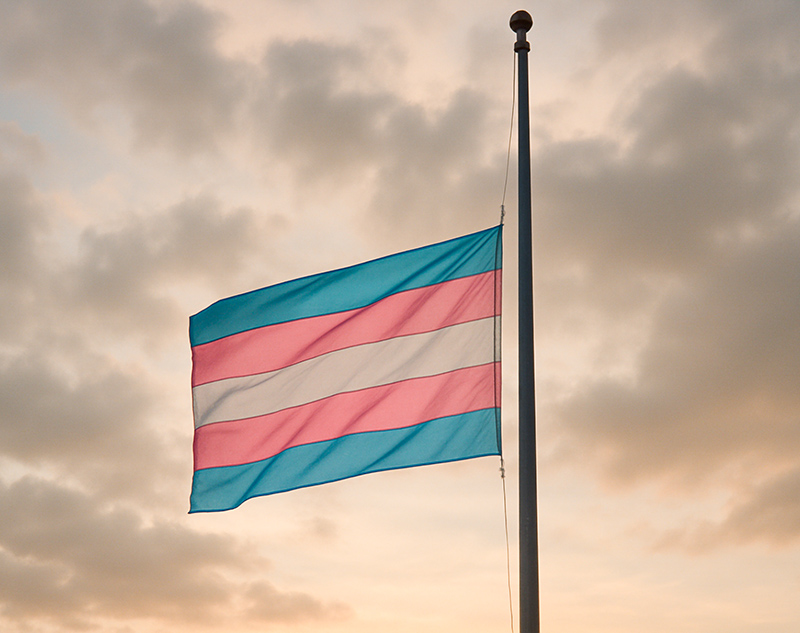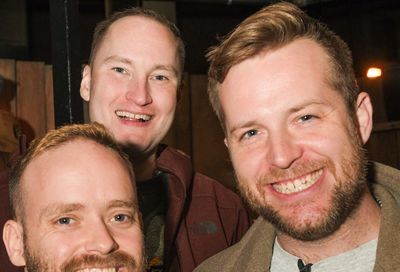Utah’s Potty Police Fail to Trap Violators of Anti-Trans Law
The state auditor's office failed to confirm details in 4 of 5 investigations, after being flooded with 12,000 apparently fake complaints.

John Dougall, whose office has been tasked with enforcing Utah’s law restricting transgender people from using public bathrooms that align with their gender identity, announced on June 5 that they had failed to confirm that any government entity has broken the law.
“Of the more than 12,000 complaints received, the overwhelming majority were frivolous at best and transparent hoaxes at worst,” the state auditor said in a news release. It was a reference to transgender advocates and allies who flooded the state’s tip line with fake complaints.
Of the 12,000-plus complaints received, Dougall’s office had singled out “five complaints that we thought might reflect a good-faith effort” to report instances where individuals may have entered spaces not matching their assigned sex at birth.
However, the office was unable to substantiate the allegations in four of the five incidents and closed the investigations related to those complaints.
The fifth complaint remains under review, according to Utah Public Radio.
Dougall noted that one of the issues that arose in the investigation into those complaints — namely one involving a government building in Duchesne County, and another involving the Provo School District — was whether entities had, in keeping with the law’s requirements, adopted and had a copy of a plan on how they would comply with the bathroom restrictions.
Both the county and the school district were warned that they have 30 more days to adopt such plans.
Under the law, transgender individuals are barred from accessing bathrooms, changing rooms, and locker rooms that align with their gender identity in schools or universities.
Transgender people are also barred from accessing gender-affirming changing spaces and locker rooms in government-owned facilities, such as the state capitol or municipal government buildings.
Private entities are allowed to determine their own policies on bathroom access. (At least for now.)
The law contains no explicit penalties for transgender individuals for entering a government-owned building’s bathroom that aligns with their gender identity, but it does make it a crime for people to enter a sex-segregated changing room that does not match their “biological sex.”
It contains an exception if a person has legally changed their birth certificate so that their legally recognized sex matches the sex for which the restroom is reserved, and has undergone gender confirmation surgery.
And while the law does not require people to show documentation to access a bathroom or changing facility, providing paperwork may be the only way for a person who meets the exceptions to “prove” they are legally allowed to access a certain space.
Additionally, schools or government entities are required to contact law enforcement if they receive any complaints from cisgender individuals who merely believe they have seen a person access a changing room that doesn’t match their assigned sex at birth.
Any government entities found to be lax in enforcing the law can be prosecuted by the Utah Attorney General’s Office and fined up to $10,000 per violation per day.
Dougall has been critical of the law and has said that ensuring compliance distracts from other work that the state auditor’s office should be doing. Still, his office continues to investigate whether government entities are in compliance with it.
Supporters of the law have argued it’s essential to protect Utahns, especially women and children, from being exposed to the presence of transgender individuals in intimate spaces.
Detractors argue that the law singles out transgender people for discrimination and casts unwarranted suspicion on them.
When HB257 was fast-tracked through the first two weeks of the 2024 Utah Legislative session, opponents also worried that it would embolden vigilante behavior, with Utahns policing each other based on their physical appearances.
Asked for more details about the four complaints his office has stopped investigating, Dougall told the Utah News Dispatch, “I would genetically describe [the complaints] as broad allegations of an individual who appeared” in a facility where another person did not feel they belonged.
Dougall noted, however, that there were no records of any complaints filed in those four instances, and auditors couldn’t determine the date when the alleged violations occurred.
Support Metro Weekly’s Journalism
These are challenging times for news organizations. And yet it’s crucial we stay active and provide vital resources and information to both our local readers and the world. So won’t you please take a moment and consider supporting Metro Weekly with a membership? For as little as $5 a month, you can help ensure Metro Weekly magazine and MetroWeekly.com remain free, viable resources as we provide the best, most diverse, culturally-resonant LGBTQ coverage in both the D.C. region and around the world. Memberships come with exclusive perks and discounts, your own personal digital delivery of each week’s magazine (and an archive), access to our Member's Lounge when it launches this fall, and exclusive members-only items like Metro Weekly Membership Mugs and Tote Bags! Check out all our membership levels here and please join us today!


























You must be logged in to post a comment.